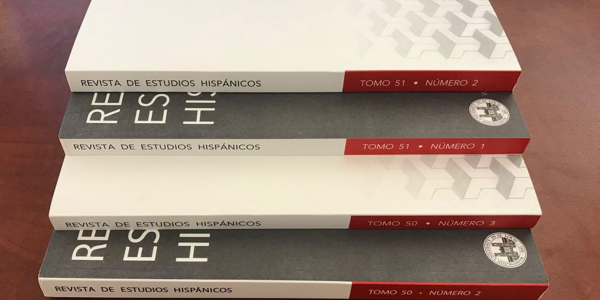In an attempt to expedite the publication process, the Editors of the Revista de Estudios Hispánicos request that authors adhere to the following recommendations when preparing their articles.
Important Changes to Note:
Our issues will be published in the months of March, June, and October.
All essays submitted from this point on should be prepared according to the guidelines in the Ninth Edition of the MLA Style Manual, the correct MLA documentation guide for scholarly journal publishing.
In addition, a 200-word summary and a brief list of keywords should accompany each essay. The summary should be written in English, regardless of the language of the essay itself, and the keywords should be written in both English and Spanish.
- Please ensure that your name does not appear anywhere in the initial submission of your manuscript (including references to your own work in the first person). An acknowledgment note should not be included in the submission, as it may compromise the anonymity of the process. (It may be included after the essay has been accepted.) Instead, your essay should be accompanied by a cover sheet (in a separate file) that will include the necessary identifying information, such as your name, address, and the title of your essay.
- Place all notes at the end in a separate Notes section (endnotes). Use the same font as the rest of the text.
- The Notes (endnotes) section must always precede the Works Cited.
- If your essay is accepted, you are responsible for securing permissions for any visual images you wish to include in your article. You must then send us these permissions in writing. Finally, please ensure that all of your images are cited correctly in the Works Cited section of your essay.
- Double-check all Notes and Note numbers throughout the editorial process, as numbering may sometimes be altered during this process.
- Place no footnote in the title of the article.
- Use only one footnote per sentence. Place the footnote number at the end of the sentence, outside the period if the article is in English and inside the period if the article is in Spanish.
- Extremely short footnotes should be incorporated parenthetically within the body of the text. All parenthetical references should adhere to the MLA Style Manual (ninth edition). Place parenthetical references at the end of the sentence or clause rather than in the middle of a phrase so as to maintain readability.
- Page numbers should be placed at punctuation.
- Do not put a comma after "Thus" at the beginning of a sentence.
- Use a comma after an introductory prepositional phrase only if the phrase is parenthetical or if confusion could result without the comma.
- The list of Works Cited should conform strictly with the MLA Style Manual. Include complete titles (including subtitles) of all books.
- Bibliographies with excessive deviations from these norms will be returned to the author for emendation, thus delaying the publication process.
- Do not use an apostrophe for plurals or for decades. "The 1950s" should not have an apostrophe, for example, but the omission of the century would require one: the '50s. (Note the direction of the apostrophe. Most word processing programs automatically invert the direction. You must enter this symbol manually.)
- Do not use split infinitives or contractions. Hyphenate "twentieth-century" if it is used as an adjective: "twentieth-century literature," but not if you refer to the "twentieth century" as a time period.
- Paragraphs of more than an entire page are extremely difficult to follow. Divide excessively long paragraphs where appropriate to the logic of the argument. But also avoid extremely short paragraphs. A paragraph should always consist of more than one sentence Insert a space before opening a parenthetical page reference.
- In the body of the text the period should follow the parenthetical page reference. If a quotation is indented, the period should follow the last word of the quoted passage, not the parenthetical page reference.
- For each journal entry included in the Works Cited, include the issue number when available, along with the volume number, since the issue number is essential for identifying issues paginated separately in annual volumes and is even useful for specifying consecutively paginated issues.
- Include the name of the online database in the Works Cited reference. Online databases aggregate articles and may sometimes change the original pagination or typography.
- When quoting text from an original source, quote in the same language as the original quote if the text is in Spanish or English. Do not rewrite the quote by translating the text yourself. For example, when quoting from a Spanish text, quote in Spanish, and do not translate it to English. When quoting from a text written in a language other than English or Spanish, provide a translation in the language of your article (English or Spanish) immediately following the original text.
- Avoid indenting/starting a new paragraph after a set-off quote.
- It is the author's responsibility to verify the accuracy of all quoted and cited material in the manuscript.
- Ensure that your final manuscript still adheres to the limit of 9,000 words (including Notes and Works Cited) indicated in the submission guidelines.
Click here for the print-friendly version of these guidelines.
Unsolicited book reviews will not be published. We accept book review requests for critical works such as monographs and anthologies of essays in the fields of literary and cultural studies as well as scholarly editions of secondary works. We do not take requests for reviews of fiction, poetry, facsimiles, or historical studies.

